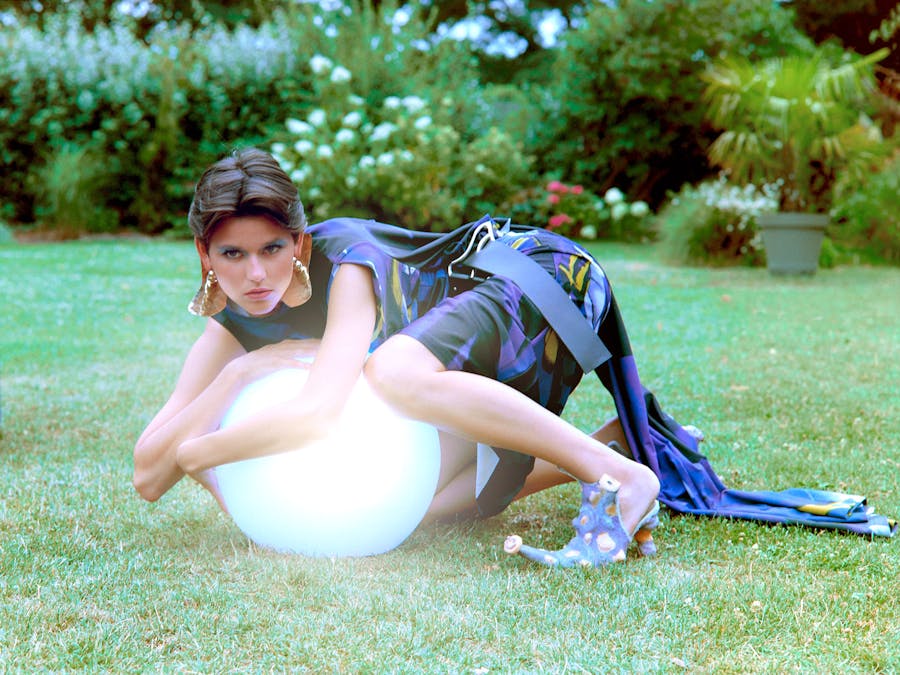Last July, Édouard Baer rented a house in the South for his daughter, his partner, his friends...All of a sudden, came the question: “But who will cook? Myself and the others... And I was getting more and more into it, whilst I was trying out this kind of family life.” Has he got a speciality? “No. More just ways of cooking the chicken or the fish. You have to know how to pre-heat your oven, and I rub the chicken with olive oil. And I stuff it with garlic bread rather than bouquet garni.” Whilst I take notes, Édouard laughs, with that laugh of his, disarming, overwhelming, joyous, poetic…
⏤We are one and the same: all the generations muddled together. We would like to spend many hours at a time with Édouard, keel over, with that kind of hopeful joy, be swept away in those delicate, hilariously funny improvisations, be carried away with his memories and his eyebrows which become a circumflex to remind us of certain values, a few principles which you don’t joke about, under pain of losing his friendship. It’s never just “you’re with me or against me” with Édouard, but you have to share a certain understanding of life, of pleasure, of emotion, of attention to others and an absolute necessity for the imagination…
⏤Édouard has already gone off again about a Pierre Tchernia film in which Michel Carrault and Roger Carel meet in a hot televised political debate, parodic and yet so true. “Carel was attacking Serrault about the cost of living, the price of steak. ‘But what cut of beef, what type of steak?’ Serrault says back. For me, it’s the topside that I want, one of the choicest cuts...” Yes – Édouard’s cuisine is simple and imaginative, and political debate does not joke around with the reality of a hot stove.
⏤Let me tell you – it isn’t easy to write about Édouard, because Édouard is capricious, whimsical, imaginative: every word counts and there are approximately 10-15 ideas in just one of his phrases, said in that voice that we love, with that deepness to it. And also because everyone has their own idea of Édouard.
At the start of last summer, a Twitter user posted this extract from one of the cult episodes of Burger Quiz in which, in front of an (almost) poked-faced Gérard Darmon and Chabat, Edouard launched into a comedic panegyric of a wizened, caricatural Darmon. The dozens of comments that followed had, in turn, each identified a word, a catchphrase or an image from Baer’s episode. Each has his or her own. There is something for everyone. He is universal, Edouard, because he expresses our dreams, our emotions, our laughter, our regrets, our crazy hopes. “I am preparing a film in which I want to bring together, like for a last supper among friends, some magnificent figures... Trintignant, Arno, Lonsdale, Dutronc, Arditi... Sadly Charles Gérard and Rochefort, would be missing, of course. A bit like the dinners my father used to have with his friends,” Edouard says...”My father wasn’t rich, but well off and free and my parents symbolised for me this kind of Café Society of the 30s or 50s. They would cross paths with all sorts of people, from famous doctors, to Jean Marie Rivière, to Dali or the Rothschilds.” That kind of thing only happens to Edouard, right? “Crossing paths” with “some” of the Rothschilds or spending evenings with Tito Le Gitan and Pat Le Rat of course.
⏤ In his latest show, The Elucubrations of a Man suddenly Struck by Grace, Edouard encounters a stage manager and Pat emerges from the back of the room to say two words: “One evening,” Edouard remembers, “they surprised me. Tito was following Pat, no reason, just because.” ‘I’ve come with the Gypsy’, Pat said, king of the evening though there for less than two minutes.
⏤ Tito and Pat took part in the programmes which, last June, Edouard suggested to Laurence Bloch, the head of programming at France Inter. “It was my contribution to the war effort. One hour every evening, live from my house and basically improvised. 250 guests in a month and 25 chefs. Tito, guitar in hand, oversaw the cooking. Tito and Pat are coming on tour with me this autumn. I like touring. Really discovering towns I don’t know very well, from the inside. I don’t like touring in a bus or in a car with tinted windows. I’ve asked for a ramshackle old Rolls. Pat, Tito and his guitar. We’ll go from town to town and we’ll sell the Rolls for Christmas.” No need for the old Rolls to bring the show back the Théâtre Antoine in January. Personally I’ll be going to see it for a fourth time. He has never been so much himself as in this show. “It’s like a line of flight. The will to confront this perpetual desire to escape, but without forgetting any one, from Gary to Camus via Malraux.” As if he was taking up the mnemonic baton, a Modiano born in the 1970s.
⏤ When he was young, some of his father’s “friends” got him an internship in a bank (!). Then in the marketing department of L’Express. Then they helped him study theatre. Then he met Jean-François Bizot, the star-maker, the impresario, a man who helped the talents of singers, musicians, actors and authors come to fruition. “He knew how to set the talent at ease. Find within them that which enabled them to become who they were.” What a lovely tribute to Bizot and his vocation, which is not something you can learn at business school. With Ariel Wizman, whom he met through Bizot, he got his start in radio (Nova) and then TV (Canal), and he became what he truly was: Edouard Baer. And all of us have lived alongside him since, trying not to miss a single thing. I don’t know about you, but I feel very close to Edouard, when he confides: “Sometimes I start improvising, half-smiling, half-serious, and I find myself saying two or three more serious things and...I didn’t really know, before I said it, that I actually thought that.” It’s refreshing and reassuring to hear this, isn’t it ?
⏤ He quotes the marvellous Emmanuel Berl: “What are you thinking about ?” a journalist asked him. “I’m thinking in general”, Berl replied. And then another writer who said: “I write to find out what I think.” “Is this the book you wanted to write?” someone asked him. “I don’t remember what I wanted to do at the start.” He smiles as he says that, but not entirely. “At school the imagination isn’t something that is talked about very much, and that’s a great shame. They teach you to construct your brain, not to escape.” I think of all those technocrats and I want to hug him. Don’t you ? “You have to cultivate it very quickly, your imagination. If not, you don’t give it permission. As if imagination only belonged to artists.” Edouard Baer thinks the opposite.
⏤ 2002. Already a long time ago. With the freedom Chabat gave Edouard in a €50 million film (Astérix. Mission Cléopâtre), and under the vaguely disapproving gaze of the ‘monsters’ Depardieu and Clavier (as well as the young Jamel), Edouard improvised an amazing monologue: “Life is all about meetings. There have been people who helped me at a moment when I couldn’t, when I was isolated in my own life...” It has become legendary. Edouard remains inscrutable in front of this calling card, like a hieroglyph on Chabat’s pyramid.
⏤ The bi-athlete Martin Fourcade was four years old when this defining Astérix was released. And, at the beginning of this year, when, with a final victory he brought an end to his career as the most decorated French champion of all time, he quoted Baer/Otis’s speech at length. Two whole minutes, almost completely verbatim, in to the TV reporter’s microphone and to the general amusement of everyone around him. He had been waiting for years for an opportunity, for the question that would enable him to give that response.
⏤ Since it was his last competition, he was going to give it regardless of the question asked. An exceptional moment, not only in TV terms, but as a moment of living culture and creativity.
⏤ I am almost obliged to explain to Edouard the wondrousness of that joyous homage. Of that reference point which continues always to free the imagination.
⏤ Edouard listens to me, appreciatively and smiling, but immediately his mind comes back to the present, concentrating on the tightrope of real life. The life of the here and now, of tomorrow. Of the coming moments.
⏤ Which we are lucky to be able to live with him...
Translated into English by Sara & Emma Bielecki.





